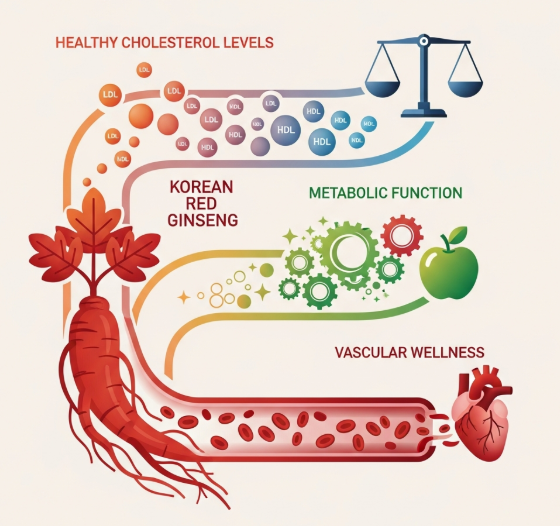High cholesterol has become one of the most widespread metabolic concerns in modern life—affecting adults from age 25 up to 60+. While many associate cholesterol issues with aging, the truth is that today’s lifestyle—stress, processed food, lack of sleep, and low physical activity—has caused abnormal lipid levels to appear earlier than ever.
What most people don’t realize is this: cholesterol isn’t the enemy. Your body needs it for hormones, cell membranes, and brain health. The real problem is imbalance, especially when LDL particles become oxidized, triggering inflammation and raising cardiovascular risk.
In this article, we’ll explore:
- What high cholesterol really means
- The hidden connection between lifestyle + inflammation
- Why dyslipidemia now appears in the 25–40 age group
- How Korean Red Ginseng supports healthier metabolic and vascular function
- What science says about ginsenosides and lipid modulation
And, importantly, we maintain neutral, evidence-based explanations following Google Health & E-E-A-T standards (no disease claims or cures).
What “High Cholesterol” Actually Means (Simplified But Scientific)
Cholesterol issues are not about one single number. Instead, it’s the pattern that matters:
1. LDL Cholesterol (Low-Density Lipoprotein)
LDL is often labeled “bad cholesterol”, but LDL itself isn’t harmful.
Oxidized LDL (oxLDL) is the real danger because it triggers arterial inflammation and plaque formation.
2. HDL Cholesterol (High-Density Lipoprotein)
HDL helps transport excess cholesterol back to the liver. Higher HDL generally supports cardiovascular health.
3. Triglycerides
High triglycerides are common among:
- people with high sugar intake
- insulin resistance
- high stress
- sedentary lifestyle
4. Inflammation: The Missing Link
Modern science shows that chronic inflammation—often driven by stress, poor sleep, and diet—plays a more central role in cardiovascular risk than cholesterol alone.
External reference:
Harvard Health explains the inflammatory component of atherosclerosis clearly.
https://www.health.harvard.edu/heart-health/understanding-chronic-inflammation
Why Younger Adults (25–40) Now Experience Cholesterol Imbalance
In the past, cholesterol concerns appeared mostly after age 45. Today, abnormalities are common in younger adults because of:
⭐ 1. Chronic Stress → Cortisol Dysregulation
High cortisol increases glucose production and shifts fat metabolism, influencing triglycerides and LDL.
⭐ 2. Sleep Deprivation
Sleep impacts lipid metabolism and hepatic fat handling.
⭐ 3. Diet High in Processed Oils, Sugar, and Trans Fat
This combination increases triglycerides and LDL oxidation.
⭐ 4. Desk Jobs & Sedentary Work Culture
Low movement = slower lipid clearance.
⭐ 5. Metabolic Slowdown in Early Adulthood
Metabolic changes begin earlier than expected, especially with poor lifestyle habits.
The 40–60 Age Group: Different Risks, Same Root Cause
While the younger group experiences cholesterol imbalance due to lifestyle imbalance, adults aged 40–60 face additional factors:
- Hormonal decline (estrogen/testosterone)
- Reduced vascular elasticity
- Decreased mitochondrial function
- Increased inflammation (“inflammaging”)
This makes lipid metabolism less efficient and cardiovascular risk gradually increase.
Where Korean Red Ginseng Fits Into the Picture
Korean Red Ginseng (Panax ginseng) has been studied for its adaptogenic, antioxidant, and physiological support properties. Its potential roles in lipid management are not about “treating” a disease, but rather supporting the body’s natural metabolic balance.
🧪 What the science says (neutral, evidence-based)
1. Ginsenosides and lipid modulation
Some studies suggest that ginsenosides may influence lipid metabolism by supporting healthier cholesterol transport and reducing oxidative stress around LDL particles.
2. Antioxidant properties
Korean Red Ginseng may help reduce oxidative stress—important because oxidized LDL plays a significant role in cholesterol-related vascular issues.
3. Supports endothelial function
Healthy blood vessels help maintain normal vascular tone and circulation, important for individuals with concerns about lipid balance.
4. May support metabolic efficiency
Research has explored how ginseng influences energy metabolism and glucose regulation—two systems closely linked with triglycerides and lipid handling.
External neutral scientific references:
- https://www.ncbi.nlm.nih.gov/pmc/articles/PMC3659556/
- https://www.ncbi.nlm.nih.gov/pmc/articles/PMC3615830/
(Catatan: Ginseng tidak menggantikan perawatan medis apa pun. Konsultasikan dengan tenaga medis untuk kondisi kesehatan spesifik.)
How Korean Red Ginseng Helps Both Age Groups (25–40 & 40–60)
Korean Red Ginseng provides unique support because it influences multiple body systems relevant to lipid health.
🔵 For Ages 25–40: Stress & Metabolic Overload
✔ Supports balanced energy & stress response
Chronic stress can influence lipid imbalance via cortisol.
Ginseng’s adaptogenic activity may support a healthier stress response.
✔ Helps with antioxidant capacity
Younger adults often consume processed food and experience oxidative stress. Antioxidants from ginsenosides may help buffer this.
✔ Supports daily stamina for busy lifestyles
Better energy → more activity → healthier lipid balance.
🔴 For Ages 40–60: Cardiovascular & Metabolic Efficiency
✔ Supports vascular health
Healthy endothelial function keeps circulation smooth.
✔ Helps maintain balanced metabolic function
Metabolism slows with age; ginseng may support more efficient energy utilization.
✔ Supports immune balance
Inflammation tends to increase after age 45; ginseng may help support overall immune homeostasis.
Lifestyle Synergy: Ginseng Works Better With These Habits
Ginseng is not a magic fix—but it works best when paired with:
✓ 1. More whole foods, less processed oil
Replace seed oils with olive oil or avocado.
✓ 2. Prioritize sleep
6–8 hours improves lipid regulation.
✓ 3. Move daily
Even 20 minutes walking improves triglyceride handling.
✓ 4. Manage stress
Breathing exercises → lower cortisol → better lipid balance.
✓ 5. Stay hydrated
Helps circulate nutrients and metabolic byproducts.
Conclusion: High Cholesterol Is a Metabolic Signal — Not a Sentence
High cholesterol is often a sign that the body is dealing with stress, inflammation, or metabolic imbalance. By understanding the factors behind it—diet, stress, age, lifestyle—you gain more control.
Korean Red Ginseng offers natural support for:
- metabolic efficiency
- vascular health
- oxidative balance
- energy
- stress resilience
This makes it relevant for younger adults who want prevention and older adults who want maintenance.







